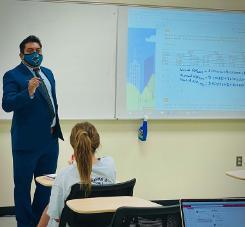Making an Impact: Sourav Batabyal, Ph.D.


Sourav Batabyal, Ph.D., assistant professor of economics, joined the Wall College of Business faculty in Fall 2019. He grew up in the eastern part of India, Kolkata, also known as the “city of joy.” He knew that he belonged at the University when he saw the advertisement for an assistant professor position at CCU, which bears an uncanny resemblance to his hometown because the airport code there is CCU.
Batabyal attended Scottish Church College in Kolkata, where he received a bachelor’s degree in economics and minors in mathematics and political science. He traveled to the United States to pursue additional studies because he thought the American educational system would challenge him to study in a competitive, world-class environment and open up more opportunities in the future. He enrolled at the University of Wisconsin-Milwaukee, where received his master’s and doctoral degrees in economics.
According to Batabyal, teaching was one of the most rewarding parts of his academic experience. While in graduate school, Batabyal received extensive training in research and teaching that inspired him to pursue an academic career. His goal as a professor is to prepare the future community and business leaders to think critically, reason ethically, respect the dignity of people, promote the greater good of the global community, develop leadership skills in service to others in building strong communities, and be a lifelong learner in search of truth.
Currently, Batabyal teaches urban and real estate economics (undergraduate) and real estate market analysis (graduate) courses at CCU. In urban economics, he teaches the location choices of firms and consumers and how these choices affect city size, urban growth, the spatial distribution of economic activity such as neighborhood choice, housing, education, poverty, segregation, crime, congestion, etc. A few fundamental questions are explored: Why do cities exist? Why are they located where they are? Why do some cities grow and others decline? Within a city, what determines where people live, how they commute to work, and what they pay for housing? Why do firms cluster? etc. In real estate market analysis, he uses economic theories, big data, and analytic techniques to assess various forms of real estate investment and urban development through critical issues, like trade-area dynamics, vacancy and absorption rates, market demand, location quotients, economic base, and shift-share analysis, employment trends, etc. He says, “Students perform better typically with applied learning and hands-on experience and real-world commercial real estate data to make decisions on project feasibility, location choices, changing demographic patterns, identifying new markets, and managing investment opportunities.”
This academic year, he is happy to interact with students in person. While he is grateful for technology during online teaching, nothing compares to in-person classes, and he is looking forward to working more with students to collaborate on research. In urban economics, students are required to write term papers on various urban and real estate topics. Last year, one of his students wrote a term paper on the “Impact of the opioid crisis in an urban setting: Evidence from Huntington, W. Va.”. The student extended her research in her pre-doctoral fellowship and was later admitted into a top Ph.D. program in economics. This year, he assigned a term paper where each student explored the city or town where they lived and researched several aspects like housing, education, crime, transportation, etc., and how those might change in a post-COVID-19 society.
Batabyal believes research is very important for a successful academic career. He says, “To be a good professor, you need to constantly update your knowledge with what is happening in the real world so you can tell those stories to your students.” He has varied research interests in the fields of real estate, financial institutions, corporate finance, urban and regional economics, development/international economics, and applied econometrics. His research articles are published in Economic Modeling, The Quarterly Review of Economics and Finance, The Journal of Economic Asymmetries, Journal of Risk and Financial Management, Progress in Development Studies, and Atlantic Economic Journal. Dr. Batabyal helps students to fine-tune their ideas and write their papers in a structured format. By uploading his own research papers for students to have full access to, he provides structures on how the typical research papers are written. “Many students get overwhelmed with longer research papers, but having a structure reference boosts confidence in students,” says Batabyal.
Our daily lives are surrounded by our built environment. In recent research, Batabyal finds the attributes, which are important for house price premiums and regarded as environmentally friendly, such as walkability, being located in a principal city, and highway access, also serve as potential transmission vectors for the spread of COVID-19. He thinks we have to take a lesson from this pandemic and reshape our built environment. In other research, using data from the initial outbreak of COVID-19, he finds that a 1% increase in Social Vulnerability Index (SVI) will underestimate the cases rate by 0.03-0.07%. However, the inclusion of population density greatly improves the predictive power of the SVI in the case of the COVID-19 outbreak. He will present one of his research papers and chair a session on “Real Estate Markets” in this year’s Southern Economic Association Annual Meeting at Houston in November.
Batabyal currently serves as a faculty advisor of Coastal Real Estate Club (CREC). It is a very active student group that arranges discussion sessions on a nearly weekly basis throughout the academic year to allow members and others to hear about current trends in commercial real estate. In addition, the club organizes site visits to various regional properties and locations to network with industry leaders and sets up mentoring and shadowing programs with professionals in the commercial real estate industry in the area. In Spring 2021, he organized a virtual real estate market analysis seminar which was attended by 50 stakeholders including students, faculties, and industry professionals.
He is one of the spearheads for Wall College’s new concentration in real estate and hopes to bring a real estate major to the University in the near future. “With the recent collaboration with FIABCI, the International Real Estate Federation, and Valbridge Property Advisors, our potential real estate majors would be well-positioned to find internship opportunities in reputed national and international real estate organizations,” says Batabyal.
Batabyal had a busy summer being a guest speaker in three different locations: Tidelands Health Leadership Academy, Surfside Beach Rotary Club, and Waccamaw Sertoma Club. The topics ranged from the economic outlook of Horry County, challenges and opportunities of healthcare industries, to innovations in the fintech industry: blockchain and bitcoin. He is intrigued with the idea of bringing a digital currency course to Wall College while there is a generational opportunity for students to become leaders in this sector. In a recent interview with Zippia, a website that helps people discover new jobs and career paths based on comprehensive rankings and profiles of companies, Batabyal articulated how the future job market will change and what skills students need to be successful in an ever-evolving job market.





